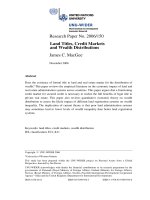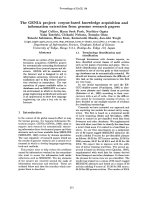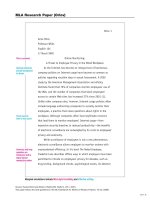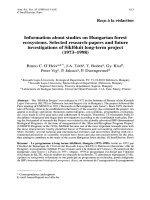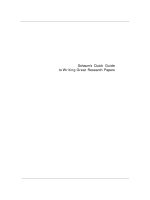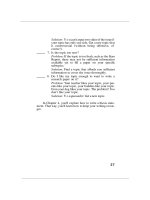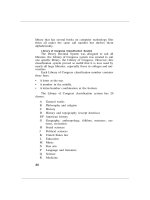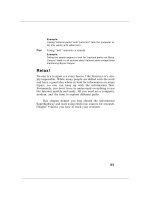FULL RESEARCH PAPER
Bạn đang xem bản rút gọn của tài liệu. Xem và tải ngay bản đầy đủ của tài liệu tại đây (880.25 KB, 16 trang )
HO CHI MINH UNIVERSITY OF
FOREIGN LANGUAGE AND INFORMATION TECHNOLOGY
DEPARTMENT OF FOREIGH LANGUAGE
RESEARCH PAPER
THE FRIVOLOUS THINGS COLLEGE STUDENTS DO
WHEN THEY ARE UNDER PEER PRESSURE
Instructor: TRAN MY UYEN
Student: BUI THI DIEM TRINH
Student ID: 18DH710605
Class: BA1802
Ho Chi Minh City, June 16th, 2021
ABSTRACT
Peer pressure is a current problem that most students have to suffer one way or another. The
impacts of peer pressure are various and unpredictable, so it leads students to run for some
frivolous things in daily things that they don't even think about before. This study aims to
determine things that students tend to do when they are affected by their peers and how they
are changing their mind when they are under peer pressure. It investigates whether the
relationship between peer pressure and frivolity has affected students' life. In this context, peer
pressure is as obesity, people could do everything to lose weight, but most of those things are
often toxic.
To emphasize the hypothesis that peer pressure is the catalyst that leads students to do
something frivolous, an online survey was posted on Facebook and Zalo. Respondents were
Huflit students from the first year to the fourth year, they had to answer 10 questions about
something related to their feelings about peer pressure and frivolous things. The results showed
that most students accepted they sometimes tend to do something to follow their peers, and
those who feel peer pressure are envious of their peers for everything they have.
Base on the results, peer pressure contributes partly the behavior and attitude’s students, from
something basic to something important. In college years, friends are whom students spend
the most time with, so they cannot avoid doing things that they wouldn’t normally do before
to fit with their friends. It seems that they become another people and they gradually lose their
true value. Choosing clothes or buying stuff is not to satify students’ demands anymore, they
will think how their friends or peers react when they do something new. Therefore, it is
unavoidable for students to follow their peers one way or another. Doing things unnecessary
will be good if students realize they are better when they shape themselves like their friends.
Everything depends on students’ perception. On this basic, the relationship between peer
pressure and motivation should be conducted to get a better perspective about “positive peer
pressure”.
1
INTRODUCTION
Nowadays, the term of peer pressure is not unfamiliar to many people, especially youngsters.
On the daily routine, no students can refuse that they haven’t ever heard the complaints or the
comparisons from their parents about “the other children”. This stuff is an objective factor, but
we cannot ignore the subjective factors. Therefore, in this research, we will dip into how
students feel peer pressure and things they did when they feel peer pressure. Although various
studies have been conducted to point out problems of peer pressure, insufficient attention has
been focused on frivolous things students tend to do when they feel peer pressure. In this study,
the relationship between peer pressure and frivolity will be explored further. The main objects
of this research are Huflit students who are in vulnerable and sensitive times. Because of their
unstable psychology, they tend to do something unusual or imitate someone whom they
usually meet as their peers. It first shows the frivolous things that students sometimes do, then
this study will point out the misunderstanding about peer pressure, and finally addresses the
shortages in the research that need to be done soon.
2
LITERATURE REVIEW
Peer pressure is like a disease and no one gets immune to it. Everyone has to accept that they
have already experienced this kind of pressure at least once in life. Most exceptionally, college
students are those who easily get into peer pressure because they are vulnerable and in the
period of transition into adulthood. At this time, friends play an important role in their life,
students sometimes feel kind of turmoil when they and their friends have nothing in common.
That is a symptom of peer pressure which is defined in many ways. According to the
Cambridge Dictionary, peer pressure is defined as "the pressure that you feel to behave in a
certain way because your friends or people in your groups expect it." Among parental pressure,
teacher pressure, peer pressure which can make students do something ill-conceived, peer
pressure is unavoidable for many kind of ages, but students are the most vulnerable ones. That
is the reason why peer pressure leads students to do some frivolous things. The following
reasons will attempt to support this hypothesis.
According to a research of website Addiction Center which was published in 2011, there were
310,000 students using marijuana and 636,000 of them using heroin. That led to several
accidental deaths up to 1,717 in 2001. College life means no more parents' control, no more
privacy interference, no more curfew, so students can be in their control. But they will start
the series of party lifestyle days with their friends whom they will spend the most time in this
period. Accompanying with the independent life is the fear feeling of loneliness. Because of
the fearfulness of being isolated, students tend to try to do something they wouldn’t normally
do before. The study of Pham Bich Diep, Ronald A Knibee, and two other co-authors who
used multi-level to analyze the factors of alcohol consumption of Vietnamese students. This
study was published in 2016 had conclusions that the drinking contexts (aspects of timing,
social aspects, or locational aspects) take a larger proportion in alcohol using than the drinking
motives, but the drinking motives still account for a large percentage. And drinking motives
followed by enhancement, coping, and conformity motives. And drinking is unavoidable when
students are in a group of drinking people.
Additionally, peers also have influences on products purchase decisions. According to
Bachman in 1993, there was too little research on the topic of peer pressure and its influences
on product purchase decisions in the consumer attitude. In order to fill this gap, a study was
made by Makgosa and Mohube which focus in Botswana to acknowledge the rule peer
pressure shape college students consumers’ products purchase decisions (2007). The products
are divided into four kinds including publicly consumed luxuries (sunglasses), privately
consumed luxuries (cell phone), publicly consumed necessities (shoes), privately consumed
necessities (toothpaste), and the findings demonstrated that public products such as shoes and
sunglasses are more attractive for more peer influences than private products because it is
consumed by the eyes of their peers (Makgosa and Mohube, 2007). No one can please
3
everyone and no one certainly does not want to be underestimated by people who take our true
value for granted (Nicole Albion, 2021). And buying stuff to please peers or friends involves
money managing of students, these problems are too complicated to solve (Nicole Albion,
2021).
Nowadays, social media has paved a broader pressure for peers to influence the students’ life.
There are three main essential parts which are mentioned by Richard Santiago including
appearances and preferences, mindset and behavior, beliefs and aspirations (Richard Santiago,
2017). An article in the journal Body Image explained that female college students often
compare their body images negatively with other girls on Facebook and the article showed that
227 of them spend more time on Facebook and concern about their appearance. This will make
profound psychological consequences for college students. Richard stated because this is
considered to be the time that students start to cultivate themselves and their habits will set
them for the rest of their. Abdulkadir Jeilani Mohamoud researched in 2014 on how social
networking sites (SNS) have pervasion in Mogadishu youth societies. The research was
conducted on the young adults between 17-22 in the leve����������������������������������������������������������������������������������������������������������������������������������������������������������������������������������������������������������������������������������������������������������������������������������������������������������������������������������������������������������������������������������������������������������������������������������������������������������������������������������������������������������������������������������������������������������������������������������������������������������������������������������������������������������������������������������������������������������������������������������������������������������������������������������������������������������������������������������������������������������������������������������������������������������������������������������������������������������������������������������������������������������������������������������������������������������������������������������������������������������������������������������������������������������������������������������������������������������������������������������������������������������������������������������������������������������������������������������������������������������������������������������������������������������������������������������������������������������������������������������������������������������������������������������������������������������������������������������������������������������������������������������������������������������������������������������������������������������������������������������������������������������������������������������������������������������������������������������������������������������������������������������������������������������������������������������������������������������������������������������������������������������������������������������������������������������������������������������������������������������������������������������������������������������������������������������������������������������������������������������������������������������������������������������������������������������������������������������������������������������������������������������������������������������������������������������������������������������������������������������������������������������������������������������������������������������������������������������������������������������������������������������������������������������������������������������������������������������������������������������������������������������������������������������������������������������������������������������������������������������������������������������������������������������������������������������������������������������������������������������������������������������������������������������������������������������������������������������������������������������������������������������������������������������������������������������������������������������������������������������������������������������������������������������������������������������������������������������������������������������������������������������������������������������������������������������������������������������������������������������������������������������������������������������������������������������������������������������������������������������������������������������������������������������������������������������������������������������������������������������������������������������������������������������������������������������������������������������������������������������������������������������������������������������������������������������������������������������������������������������������������������������������������������������������������������������������������������������������������������������������������������������������������������������������������������������������������������������������������������������������������������������������rvey and turn them into four main groups:
Group 1: Things that affect to body image
Group 2: Things that related to finance
Group 3: Things that related to alcohol
Group 4: The feelings of students in the pros and cons of peer pressure
6
3. Results of the survey
The first question is "How often do you fast the food to have a perfect body like your
friends? There are 62,9% of students ( 22 students) said that they sometimes skip meals
and follow an unscientific diet to get thinner, 22,9% of students ( 8 students) said that
they never fast the food, and finally there are only 4% of them ( 5 students) said that
they usually follow this negative thing. We can see that most of the students are wanting
to lose weight quickly and there are no ways that can help them except for fasting the
meals or using the weight-loss drugs which are popular in the quick result. For this
reason, it also points out that students can do something that affect their health with
expectations to have a good look like their friends.
Figure 1: The percentage of students who fast the meals for perfect body
7
With the second question about "How often do you use up all your pocket money to
buy an item and skip the meals to make up for it?"
The answer of students who said usually took 17,1% ( 6 students), and approximately
20% of them (7 students) said that they never use all of their pocket money to buy their
items. Surprisingly, the number of students who said that they sometimes spend their
money and have to skip the meal to make up for it accounted for 62,9%. It is provided
that students tend to enjoy and follow the trends on social media or like their peers so
that they will buy stuff like them no matter how they will be hungry or lack money for
the next few days. This situation is no more unfamiliar to most of the students now
and they even don't know which purposes for buying this stuff as well. Clearly, when
students are under peer pressure, they will think that their peers are always right and
they feel that they should imitate their peers in many ways.
Figure 2: The percentage of students who buy things with all their money
8
Another figure that relates to student's finance is "Why do youngsters often
choose luxurious places to eat, even if they are not financially suitable?". Most of
the students said that they want to show up their luxurious lifestyle on social
media. This choice accounted for 54,3%, it can prove partly about the unreal life
that students are chasing and dreaming of. Meanwhile, there are 17,2% of
students ( 6 students) reported that sometimes they choose to eat at a luxurious
restaurant to treat themselves after they have achieved or attempted something.
Finally, the proportion of people who said that they want to prove their level to
their friends took 28,6% (10 students), and this is not a small number. Therefore,
the more money students spend on frivolous things, the more disappointed they
get because they will never feel satisfied with what they have, they think that they
should get what their friends have to fit in with them.
Figure 3: Reasons for students choosing luxurious restaurants despite lack of
money
9
The third group related to some factors that lead students to alcohol path. The first
question for this group is "Is it necessary to go to a bar or pub to keep up with your
friends?" and most of them told that is an unnecessary activity which has 77,1% ( 29
students) choose this answer. However, there are still some students who think that is
essential things they have to do in order to get fit in with their friends. This means
they will feel waste their youth if they don't go to bars or pubs.
Figure 4: Opinions of students about going to bar or pub
The second question of group 3 is "Although you don't like alcohol, all of your friends
drink that, do you think you should give it a try?". Surprisingly, the number of people
who said they may drink if all their friends drink are equal to the number of students
who said they will not. Each answer accounted for 42,9% ( 15 students for each), and
there are 14,3% of students who have to drink beers no matter how they hate them
because they can not lose their friends.
Figure 5: The percentage of students who accept to drink alcohol although they
don’t like it
10
The last group is the opinions of students on how they think when they have some
symptoms of peer pressure. The first question for this group is multiple choice like the
questions above "Are you being led by frivolous things?". Because they are done these
previous questions, they can recognize that they are running for frivolity and some of
them who never think they are like that before can understand more about their situation.
The percentages of the three answers are approximate, and most of them said they
maybe do a frivolous thing which has 37,1% and students who said they are totally led
by the frivolity have 28,6%. We can see that they are gradually comprehending their
problems so that they can reduce it as much as possible.
Figure 6: The perception of students about the frivolity
With the last question, students are allowed to write down their short answers about
their opinion of peer pressure. The question is "According to your opinion, are peer
influences your pressure or your motivation? Why?", and the answer for most of the
students is pressure. They said that whenever they saw their peers achieve the best things
like good grades or better jobs, they feel envious. The feeling of envy make them feel
pressure, because of envy, they could do anything to keep up with their peers no matter
the consequences will be.
11
DISCUSSION AND CONCLUSION
Discussion & Limitation
The results indicate a correlation between peer pressure and frivolous things which Huflit
undergraduates have suffered at least once. The results are mostly meet my expectation in
hypothesis that peer pressure is the catalyst which makes students run for frivolous things.
As we can see, the frivolity is never a good thing to chase and yearn for. Students easily get
misunderstanding that running for the frivolity means they love themselves and they think
they deserve to do it. Instead of chasing their sustainable desire like their dream jobs or the
wholesome lifestyle, students are going to satisfying themselves by temporary favorites or
imitating their friends’ models who they spend most of their time in school. Peer pressure
invisibly affects students on how they expose their physical appearance and their mind.
First of all, there is one question which the result doesn’t meet the expectation that whether
students need to go to bar or pub to keep up with their friends or not, and most of them said
it is superfluous, there are many factors to prevent them from going to bar such as they have
to spend a lot of money, they are not allowed to go home lately.
The result in figure 1 showed that most of Huflit students, especially juniors, choose to lose
weight unscientifically by skipping the meals. There are many reasons for diet, and according
to the results, having a perfect body like their peers is their priority and students said that
they sometimes do it. Moreover, when students see their friends or peers have a luxurious
item, they cannot avoid their aspiration about it. The results also demonstrated the situation
that students will spend all of their pocket money to buy that item and the feeling of regret
afterward. So the only thing they could do to relieve the regret is skip the meals. They can
skip the breakfast or lunch to make up for their spent money. However, this situation will
repeat many times because they realize they can do something to compensate for money
they already spent. In addition, a virtual lifestyle is no more unfamiliar to youngsters
nowadays. Students can be online anytime and anywhere they are, so they are partially
influenced by their peers on social media and they will tend to imitate the other lifestyle
because they think it is so cool and opulent. That is the reason why students choose to eat at
luxurious restaurant in spite of lacking financial ability. They just want to boast that they are
rich or they are cool on social media. That ostentation makes students forget who they are
and what they have in their real life. When I mention to alcohol, the number of people who
said “no” and who said “maybe” are equal in the question that whether they will drink alcohol
to keep up with their friends or not. For those who said “no” means they are mentally strong,
12
they are not roused by the attraction of friends. For those who said “maybe”, this can be
“yes” and can be “no”, this means they probably drink alcohol if their friends really want
them to drink no matter how they don’t like alcohol. The last question in all multiple choice
question to clarify how much students think they are led by the frivolous things after
answering those questions above. The number of people who said “maybe” and “yes” are
approximate. This means that they partly realize they are running for something unnecessary
and that is not what they truly want, in other ways they feel kind of peer pressure. The last
question already exposed the student’s attitude about peer pressure. Instead of they feel
incentive when they saw their peers have a better job, get a good score in class, they tend to
be envious about the other achievement. This jealousy will motivate them to do unexpected
things to get good things like their peer by all means.
Limitation
In this results, most of Huflit students were on the midterm examinations, so they don’t have
enough time to do the survey which only took 4 days. That is the reason why there are only
35 students who did the survey which resulted in not enough participants as intended. I will
post this survey again after the final exam in order to make sure there is enough information
as much as possible.
Conclusion & recommendation
This research aimed to identify some frivolous things that Huflit students tend to do when
they are under peer pressure. Based on quantitative and qualitative analysis on social media,
it can be clear to notice that there is a close relation between peer pressure and the frivolity
which make students thoughtlessly chase to. The results indicate that when students feel
their peers as a pressure, they are scared of their peers and tend to do something like their
peers. To get better perception about peer pressure for students, further research is needed
to determine the relationship between peer pressure and motivation in order that students
can deeply understand both the positive and negative sides of peer pressure and they can
know what they should do.
13
REFERENCES
Addiction Center. (2021). College Students and Drug Abuse. Retrieved from
/>Abdulkadir Jeilani Mohamoud. (2014). “How Social Networking Sites in Changing Mindset
of Youth- Case Study Mogadifu-City Youth”. Retrieved from
/>Cambridge Dictionary. Peer Pressure. Retrieved from
/>Nicole Albion. (2021) “How to Deal with Peer Pressure to Spend More Money”. Retrieved
from
/>P.B.Diep; Tan, Frans E.S; Knibbe Ronal A. (2016). “A Multilevel Study of Students in
Vietnam: Drinking Motives and Drinking Context as Predictors of Alcohol Consumption”.
Retrieved from
/>Rina Makgosa & Kago Mohube. (2007). “Peer Influences on Young Adults’ Products
Purchase Decisions”. Retrieved from
/>ducts_purchase_decisions
Richard Santiago. (2017) “Impact of Social Networking Sites in Changing Mindset of Youth”.
Retrieved from
/>Valenzuely. (2013). “Peer Pressure and Social Media”. Retrieved from
/>
14
APPENDIX
Survey Questionnaire
1. Your educational status
2. Are you being led by frivolous things?
3. Have you ever been fasted the food to have a perfect body like your friends?
4. Have you ever used up all your pocket money to buy an item and skipped the meals to make
up for it?
5. Why do youngsters often choose luxurious places to eat, even if they are not financially
suitable?
6. Is it necessary to go to a bar or pub to keep up with your friends?
7. When choosing clothes, which factor is the most influential to you?
8. Although you don’t like alcohol, all of your friends drink that, do you think you should give
it a try?
9. Suppose you are struggling with things you don’t like to please other people, you think is it
worth it?
10. According to your opinion, are peer influences your pressure or your motivation? Why?
(optional)
15

